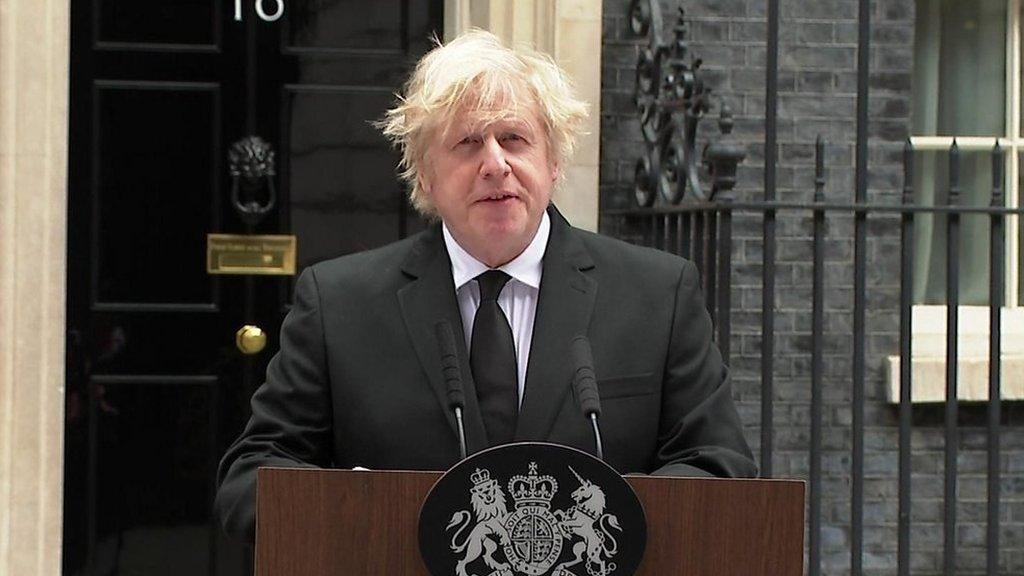The week ahead in Parliament
- Published
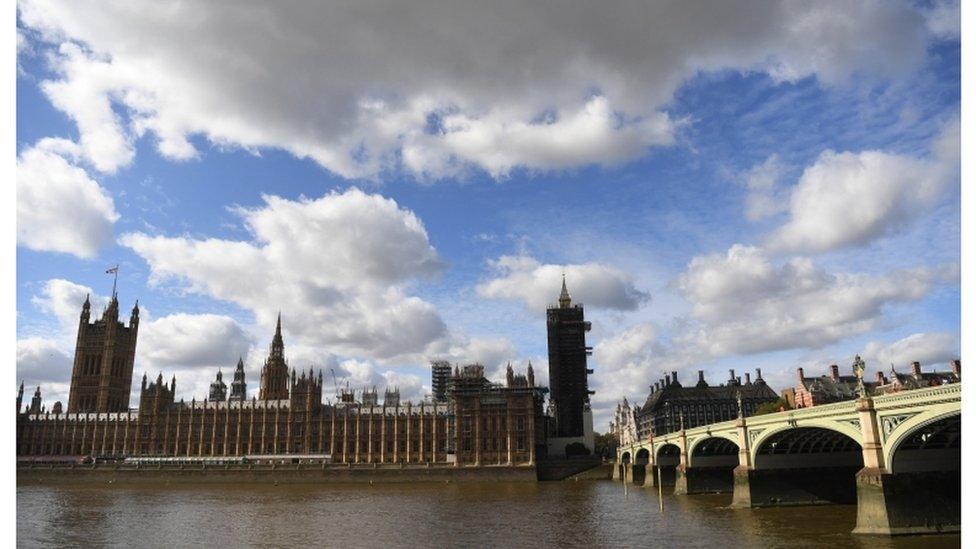
There are two clocks a-ticking in Westminster: the parliamentary year is winding down, with an expectation that it will end early in May, which means there are plenty of legislative odds and ends to be tidied up before that moment comes. Several bills are bouncing between the Commons and the Lords to finalise critical details.
There's also the countdown to the vast set of elections on 6 May, which could transform the political climate. Will there be a second Scottish independence referendum? Will Labour make headway or find itself becalmed, and are the Lib Dems still a going concern?
In pre-election periods, law-making is normally pretty low-key, although there will doubtless be some clashes over the Domestic Abuse Bill and the Overseas Operations Bill. Any parliamentary drama in the coming week is more likely to come from new revelations in the Greensill affair, or developments in the pandemic (watch out for an Urgent Question on the queues at Heathrow and foreign holidays).
One thing to watch is the select committee scramble to investigate Greensill. Public Admin are set to publish terms of reference for an inquiry into the business and lobbying issues; Public Accounts has said it wants David Cameron to give evidence, and will use a pre-arranged hearing on Thursday to question the permanent secretaries at the Treasury, Tom Scholar and Charles Roxburgh, about their roles. The Treasury Committee is in the mix too.
Monday 19 April
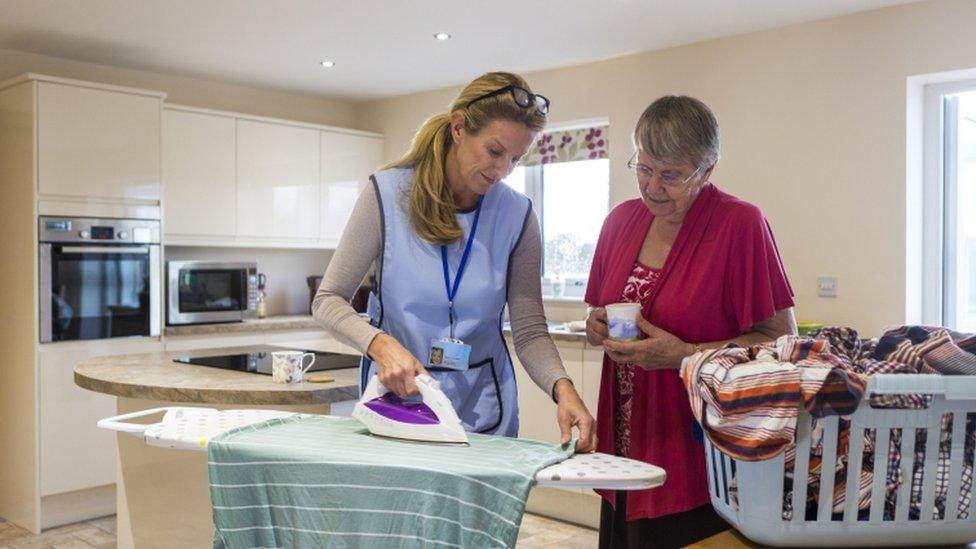
The Public Accounts committee will explore the adult social care market
The Commons week opens (14:30) with an hour of Housing, Communities and Local Government Questions. As ever, the slot immediately afterwards is prime-time for any post-weekend ministerial statements or urgent questions.
That is followed by the first day of committee stage consideration of the Finance Bill.
In Westminster Hall there are two 90-minute petitions committee debates. The first,(16:30) is on e-petition 300139: "Don't criminalise trespass." The petition, which has more than 134,000 signatures, says the government's manifesto commitment to make intentional trespass a criminal offence is "an extreme, illiberal and unnecessary attack on ancient freedoms".
The second (18:15), on e-petition 301079, calls for the government to improve maternal mortality rates and healthcare for black women. The petition, which attracted 187,000 signatures, notes that black women in the UK are five times more likely to die during pregnancy and after childbirth compared to white women and calls for more research into why this is happening.
In the committee rooms, Public Accounts (14:30) takes evidence on adult social care markets from a panel of witnesses from the Department of Health and Social Care, headed by permanent secretary Sir Chris Wormald. Early in the pandemic it published a report saying care homes had been "thrown to the wolves" in the first wave of Covid-19. Now it wants to probe the funding and operation of the sector, where provision is dominated by private equity firms.
Treasury (15:30) looks at the economic impact of coronavirus with the wastefinder-general, Gareth Davies, the Comptroller and Auditor General at the National Audit Office. Procedure (16:15), continues its deep dive into the procedure of the House of Commons and the territorial constitution with Sir Paul Silk, former clerk to the National Assembly for Wales, and former Commons Clerk, Paul Evans.
In the Lords (13:00) questions to ministers range across family policy and the treatment of skilled migrants from Commonwealth countries.
Report and Third Reading consideration of the Financial Services Bill, where the remaining issues are around parliamentary oversight, takes place.
And finally there's the Third Reading of the Overseas Operations (Service Personnel and Veterans) Bill.
Tuesday 20 April
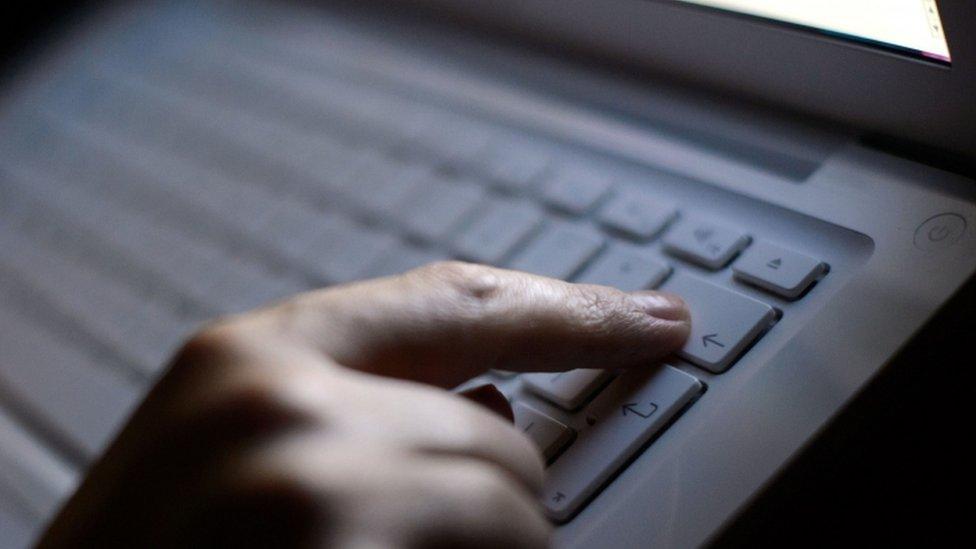
MPs will hold a debate on online abuse of elected women
The Commons opens (11:30) with Foreign and Development Office questions
The day's Ten Minute Rule Bill, from Conservative Paul Holmes, is on the need for an independent planning process for housing developments proposed by local councils.
Then MPs continue their trawl through the detail of the Finance Bill.
In Westminster Hall, former Culture Secretary Maria Miller leads a debate on online abuse of elected women (09:25). This is a debate that the members of the All-Party Parliamentary Group on Women in Parliament had wanted to hold, given the significantly higher levels of online abuse experienced by female elected members at home and abroad. It's very much a cross-party issue and I suspect many MPs will press for changes to the forthcoming the Online Harms Bill.
The debate follows a seminar by the Commonwealth Parliamentary Association on International Women's Day about the abuse of women MPs across the Commonwealth. Later, Labour's Tonia Antoniazzi has a debate on the Turing Scheme, the proposed UK replacement for the EU's Erasmus scheme for studying abroad.
On the Committee Corridor, Health and Social Care (09:30) continues its inquiry into children and young people's mental health. It'll be hearing their experiences of mental health services.
Education (10:00) takes evidence on prison education and support for learners in custody - questioning Dame Sally Coates, who led the last review into education in prisons.
In the Lords (12:00) ministers field questions on whether gambling should be treated as a health problem and put under the remit of the Department for Health and Social Care, National Marriage Week, and moving to a 50:50 gender balanced parliament.
Then peers deal with a series of end-of term legislative loose ends.
First, Commons amendments to the Air Traffic Management and Unmanned Aircraft Bill, followed by the third reading of the utterly uncontroversial Non-Domestic Rating (Public Lavatories) Bill. However, then comes consideration of the latest round of Commons amendments to the Fire Safety Bill on the key issue of builders rather than leaseholders having responsibility for remedial costs resulting from poor construction methods to make homes safe. This one will probably be pushed to a vote.
The main debate is on the latest Conduct Committee report on the registration of peers' foreign interests. The back story to this is the government seems to be moving towards legislation along the lines of the US Foreign Agents Registration. This would require MPs and peers to register earnings from governments of foreign states, following a recommendation from the Parliamentary Intelligence and Security Committee report on Russia's influence in the UK's democracy.
But, there was some some pushback with some peers arguing that this would hit those whose profession carried a duty of confidentiality, and some fearing that disclosing the identity of their clients would make them less attractive than competitors. They also say disclosing fees would put them at a commercial disadvantage.
The Conduct Committee has now digested those objections and concluded that the public interest demands that there should be no exemptions - although it does propose that lawyers should be required to disclose the identity of clients only once the relationship has entered the public domain or they have been paid. Not everybody is convinced - former Solicitor General Lord Garnier has a motion to return the report to the committee for a rethink.
Wednesday 21 April
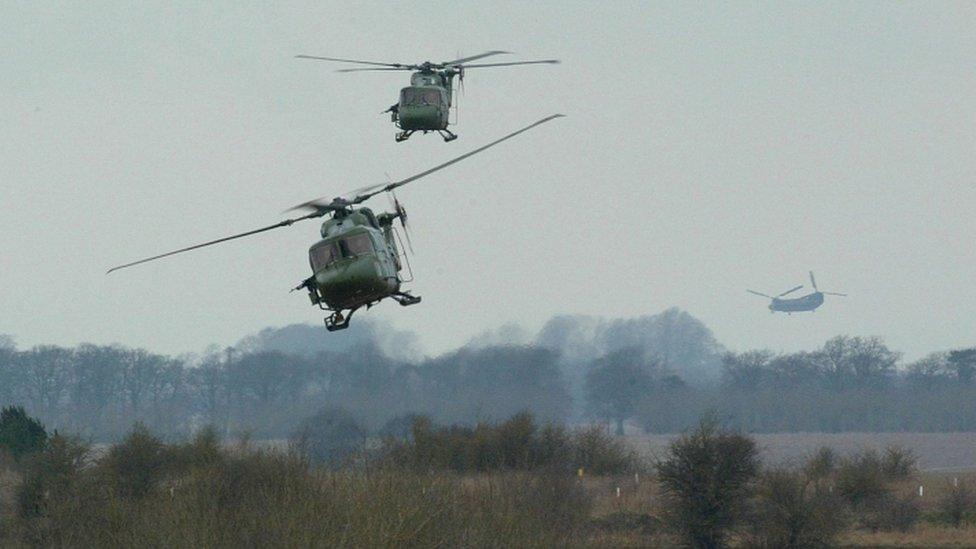
MPs will consider Lords amendments to the Overseas Operations Bill
The Commons day begins (11:30) with half an hour of Northern Ireland questions, followed at noon by Prime Minister's Questions.
The day's Ten Minute Rule Bill from Labour MP Taiwo Owatemi aims to ban the fur trade.
The main legislative action is what could be another extended bout of parliamentary ping pong - consideration of Lords amendments to the Overseas Operations (Service Personnel and Veterans) Bill.
The bill was extensively amended by the Lords - where ministers failed to prevent a clause being added to impose a duty of care on the MoD for veterans and service personnel involved in investigations and litigation around overseas operations; removing time limits for legal action against the MoD; and excluding war crimes and genocide from the presumption against prosecution, which is a key part of the Bill.
The expectation is that the government will seek to reverse these changes, but the Lords look set to dig in, having passed the various amendments by substantial majorities.
This is followed by a debate on the Committee on Standards reports on the confidentiality in the house's standards system and on sanctions in respect of the conduct of members. The first "fine tunes" the powers of the Parliamentary Commissioner for Standards to act where details about an investigation are leaked and to act to rebut inaccurate information. The second clarifies that sanctions against an MP that interfere with their core parliamentary duties can only be imposed by a vote of the House, not through decisions by managers.
In Westminster Hall, Steve Baker, former Brexit minister and leading light of the European Research Group, has a debate on the UK's accession to the Comprehensive and Progressive Agreement for Trans Pacific Partnership (09:25). He will be making the argument that technology is reducing the importance of distance as a barrier to trade, and that free trade arrangements do not need to be attached to EU-style political structures. Labour MP Tan Dhesi has a debate on support for children with special educational needs (14:30).
The day's committee action includes Northern Ireland (09:30) taking further evidence on Brexit and the Northern Ireland Protocol.
Environmental Audit (14:30) quizzes witnesses about water quality in rivers, starting with scientific experts and then moving on to witnesses from British Canoeing and Swim England, as well as rock star and campaigner Feargal Sharkey.
In the Lords (12:00) the big event of the day is the announcement of the result of the election for Lord Speaker. Then, ministers face questions on creating an emergency alert system for mobile phones and a report on the relationship between Covid-19 and obesity.
The main action is consideration of Commons amendments to the Domestic Abuse Bill. MPs have rejected the eight changes made by peers - but the government is now offering an "amendment in lieu" - an alternative proposal to the amendment from Labour's Baroness Royall, on managing repeat offenders. The question is whether it will meet her and her supporters' concerns.
Thursday 22 April

MP will debate the future of British wrestling
The Commons opens (09:30) with Environment Food and Rural Affairs questions, followed by mini-question times for the MPs who represent the Church Commissioners, the House of Commons Commission, the Parliamentary Works Sponsor Body, the Public Accounts Commission and the Speaker's Committee on the Electoral Commission.
The Leader of the House will announce the forthcoming Commons agenda. Then, there will be two backbench debates, first on the Public Administration and Constitutional Affairs Committee report on government transparency during Covid-19.
Then, there will be a debate on mass human rights abuses and crimes against humanity in Xinjiang province, China.
Finally Bolsover MP Mark Fletcher leads a debate on the future of British wrestling. Feather boas are optional.
The Public Accounts Committee (10:00) examines the affordability of public sector pensions, looking at the way pension funds covering a 16% of the working population, and a quarter of pensioners shifted from full final-salary terms to a career average system, and the resulting legal problems over age discrimination. Sir Tom Scholar, permanent secretary at HM Treasury, leads the witnesses - and will also face an hour of "urgent questions" relating to the Greensill lobbying affair. These questions will form the opening salvo in a new PAC inquiry into supply chain financing, the Covid corporate financing facilities and lobbying in the Civil Service.
In the Lords (12:00) there are questions on cuts in overseas aid, injuries caused by e-scooters, and support for students in pupil referral units.
There will be a brief third reading rubber-stamping of the National Security and Investment Bill, and then a debate on the government's integrated review of security, defence, development and foreign policy.
Neither house is expected to sit on Friday 23 April.
Related topics
- Published9 April 2021
